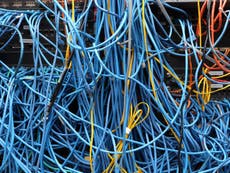Tim Berners-Lee's warnings about the internet are both too much, and too little
Thirty years after its birth, we all want different things from the web, and that means we don’t hold the power to change it

Three cheers for Tim Berners-Lee – but in celebrating his creation of the world wide web 30 years ago today, and acknowledging his concerns about its direction, we can perhaps be both more pessimistic and more optimistic than he is about the future.
Sir Tim has just written an open letter reflecting on how far the world has come.
“The web,” he writes, “has become a public square, a library, a doctor’s office, a shop, a school, a design studio, an office, a cinema, a bank, and so much more.”
But he warns: “While the web has created opportunity, given marginalised groups a voice, and made our daily lives easier, it has also created opportunity for scammers, given a voice to those who spread hatred, and made all kinds of crime easier to commit.”
We can all say aye to that.
What is really helpful too is the way he divides the problems into three broad groups: deliberate malicious intent, such as hacking and criminal behaviour; system design that creates perverse incentives, such as ad-based revenue models that reward clickbait; and unintended consequences of system design such as the polarised tone of online debate.
So what’s to be done?
Sir Tim’s vision is the new “contract for the web”, launched in Lisbon at the Web Summit last November, which will set out a new framework of laws and standards for the internet. He explains that it will be akin to humankind’s other cooperative enterprises such as the Universal Declaration of Human Rights, the Law of the Sea and the Outer Space Treaty. “Governments, companies, and citizens are all contributing, and we aim to have a result later this year.”
It is a bold and rather wonderful enterprise. Let’s applaud it. But let’s also be realistic. Those examples of cooperation were sustained because they were supported by the major powers at the time. It is hard to see that degree of international cooperation now. When you consider how access to many websites is blocked for the 1.4 billion people in China, is it realistic to expect the Chinese authorities to support open access to the web?
It is not just a question of it being very difficult to access Facebook or Google in China. Even in Europe, access to the websites of many major US news sources, including the Chicago Tribune and the New York Daily News is unavailable; an unintended consequence of the EU’s General Data Protection Regulation.
So I suggest that Sir Tim is too optimistic. He ended his letter:
“The web is for everyone and collectively we hold the power to change it. It won’t be easy. But if we dream a little and work a lot, we can get the web we want.”
Trouble is we want different things. Different countries, different interest groups and different individuals all have conflicting requirements. I am afraid collectively we don’t hold the power to change it.
As it happens, there was another example of a failure of cooperation today, when EU governments scrapped a plan to bring in a bloc-wide digital tax.
But is this so bad? Go back to the three areas of concern identified by Sir Tim. Tackling criminal behaviour, online harassment and so on is going to be a long and tedious slog. But then tackling all crime is a slog. There are greater opportunities for crime, but the new technologies also reduce some forms of crime. It you can track a car it is less likely to be stolen. Online banking creates new opportunities for fraud, but getting rid of cash reduces other forms of crime.
As for state-sponsored hacking, rogue states have always found ways of doing something similar. Overall, since the internet was invented, crime seems to have declined in most of the developed world. It may not go on falling, and nor has it fallen everywhere, but I don’t think one can associate new communication technologies with rising crime.
The second area – perverse incentives created by system design – I find less troubling. At The Independent we are in the middle of the profound changes racing through the news industry, but my worm’s eye view is that we haven’t sacrificed user value (Sir Tim’s concern) despite what was until recently a largely ad-based revenue model. We are not perfect but we really do our best. In any case, the UK is seeking ways to protect high-quality news, following the recommendations of the Cairncross Review last month (I should disclose that Frances Cairncross is my spouse).
The final area of concern – the polarised tone and quality of online debate – is certainly troubling. But I wonder whether that is a temporary result of the greater freedom of people to express themselves, rather than an embedded change in human behaviour encouraged by the internet.
Is politics really more polarised than it was 30 or more years ago? In the UK at least it seems to me no more polarised now than it was during the 1970s wave of strikes, or indeed in the early years of the Thatcher government.
Besides, while Sir Tim is concerned about the second 15 years of the internet there have been huge increases in human welfare over this period, largely as a result of the smartphone revolution and the services it made possible. The web was not much use until Google came along with a great search engine. More than 2 billion people have signed up to Facebook because they want to be on Facebook. And we have been, by and large, willing to sacrifice some privacy for the convenience of the cloud; when we use Waze to avoid a traffic jam we happily let the app know where we are. It has been an extraordinary 30 years.







Join our commenting forum
Join thought-provoking conversations, follow other Independent readers and see their replies